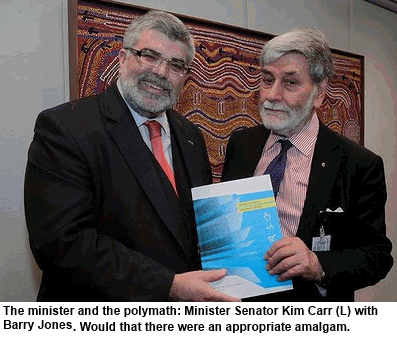|
|
|
|
|
|
|
News & Views item - July 2013 |
![]() Senator Kim Carr Back from the Wilderness of the Backbench is Making His
Presence Felt. (July 10, 2013)
Senator Kim Carr Back from the Wilderness of the Backbench is Making His
Presence Felt. (July 10, 2013)
 When
politicians or the mass media refer to the impact of scientific research they're
on about what is its value in regard to the economic wellbeing of the nation in
the short to medium term. And indeed when Australia's current chief scientist,
Professor Ian Chubb, discusses the direction that should be placed upon
research, that sort of impact is central to his approach even if not stated in
so many phrases.
When
politicians or the mass media refer to the impact of scientific research they're
on about what is its value in regard to the economic wellbeing of the nation in
the short to medium term. And indeed when Australia's current chief scientist,
Professor Ian Chubb, discusses the direction that should be placed upon
research, that sort of impact is central to his approach even if not stated in
so many phrases.
Now that Kim Carr has returned to the government's front bench, at least until the coming federal election, as Minister for Innovation, Industry, Science and Research and Minister for Higher Education he has taken a swipe at those who have been serving "temporarily" in his place by informing The Australian's Julie Hare: "I am not in the business of asking universities to write long essays or fill in more forms. We are in the business of assessing research quality against a rigorous set of verifiable standards." Senator Carr was, referring to the proposal to use case studies to measure research impact. "I am open to discussion, but in my experience we are very long on case studies and we could do with more rigorous datasets."
That's not to say that the good senator's views are fully rational : "I take the view that ERA [Excellence in Research for Australia] is the appropriate measure for international comparisons on quality. Impact is an entirely different measure. We've long had a conversation about this, particularly around verification."
Just how the ERA's condensed-rear-view-mirrored look at Australian scientific research acts as a replacement for significantly upgrading peer review by the Australian Research Council (ARC) and the National Health and Medical Research Council (NHMRC) is never argued and certainly not explained, although Ms Hare informs us that Senator Carr "was pleased with how the ERA had focused the minds of universities on delivering resources to areas of research excellence".
Wouldn't the nation be better served if the good senator,our academic administrations, and the federal granting bodies were focused on attracting and properly supporting the best scientific work rather than squandering tens of millions of dollars on ill thought out and executed proxy mechanisms?